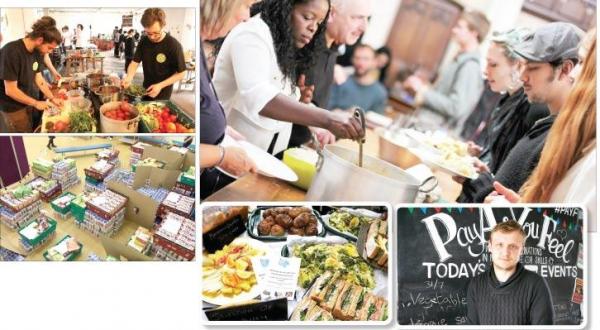In December 2013, a chef named Adam Smith launched the Real Junk Food Project which aims to reduce food waste from supermarkets, restaurants and other food outlets. Food is collected to be cooked and is served as meals at the project’s cafes. Customers pay a price that they see fit. Three years after launching the project, Smith is completely devoting himself to it. He was previously a head chef in numerous restaurants in Britain and Australia and began to run a huge network of restaurants and cafes based on the simple philosophy of “Let’s really feed the world”.
In an interview with Adam Smith, I talked to him about the concept of the project that is working to change the way that food is sold and consumed in the world, the support that the project receives from the public or official authorities and other topics.
At the beginning of our conversation, Smith points out that there are 125 cafes called “Pay as You Feel” in seven countries around the world including South Africa, South Korea, America and Australia. 95 of their cafes are located in the United Kingdom.
The basic philosophy of the project and its series of cafes is that supermarkets exaggerate the expiry dates of food products and get rid of them even though they are completely fit for human consumption. This is so that the consumption process continues and people continue to buy. I ask him about the difference between the “expiry” dates and the “use-by” dates that supermarkets put on products, which in his view, increase consumer confusion. He describes these classifications that are labelled on food products as being concerned with their “aesthetics” rather than whether they are fit for consumption. He adds “We have noticed in the food industry that there are a large number of foods on which incorrect labels are placed, such as sugar. There is a level of deception and manipulation on the part of companies and factories to confuse the consumer about whether products are fit for consumption to push them to get rid of food and purchase more unnecessarily.” However, he also points out that this is not the case for meat and fish that may harm the consumer if it is consumed after the date on the product.
I ask Smith about how the process to reduce food waste works and he replies by giving the example of the project’s biggest café in the British city of Leeds: “In Leeds we gather the vegetables, meat and other food from shops, supermarkets and other outlets. We take this to a warehouse where the food is sorted. Then we transport the sorted food to the cafes where it is prepared in the correct manner and after that it is frozen until it is ready to be served to the customer.”
When I ask Smith about how the health and environment authorities treat the project, he says “They visit the cafes regularly and rate them – we are known to use food past the expiry dates and they are fully aware of our work and don’t try to stop us. They know we have an ambition to stop food waste and in order to do that we defy some of the regulations that we think are wrong”.
At a time of recession that has hit British families hard, the number of food banks has increased but they also face the same rules of having to get rid of food when it reaches its best before dates. I ask Smith if the organisation works with food banks. He says that they cooperate with them to collect waste food that is fit for consumption, but he goes on to say that he is against the concept. “I think the whole concept is shameful – to have more than a million people queuing in front of food banks to get what is their basic human right is shameful. When we waste 15 tons of food while a million people are malnourished, that means there is something wrong. Why do they have to queue to get food while companies get away with wasting food? This happens here in Britain.”
I conclude but asking him what his dream is and he replies “to feed the world.”
